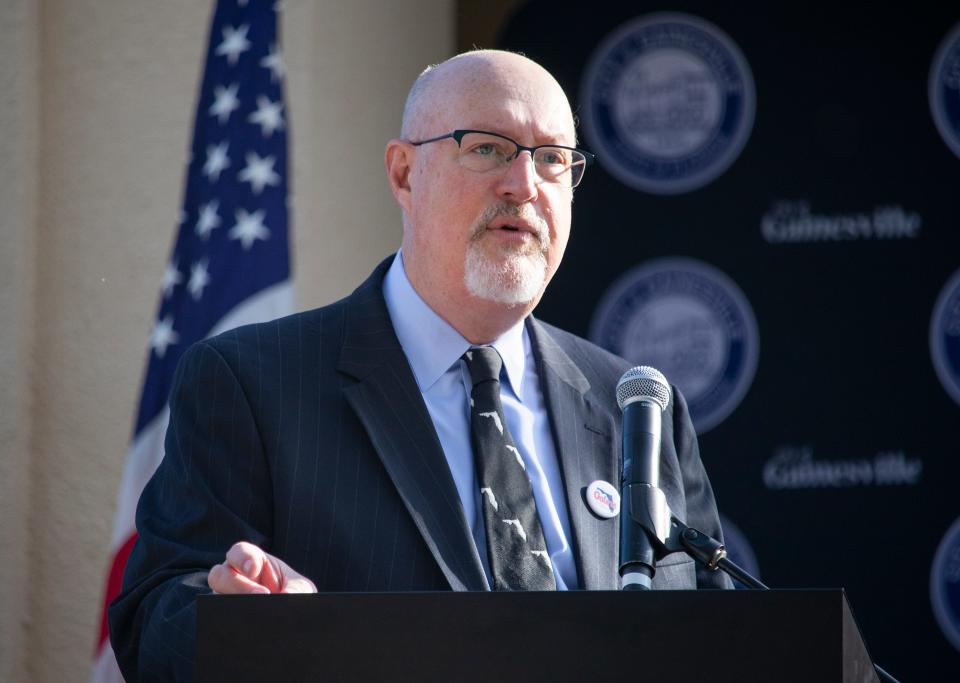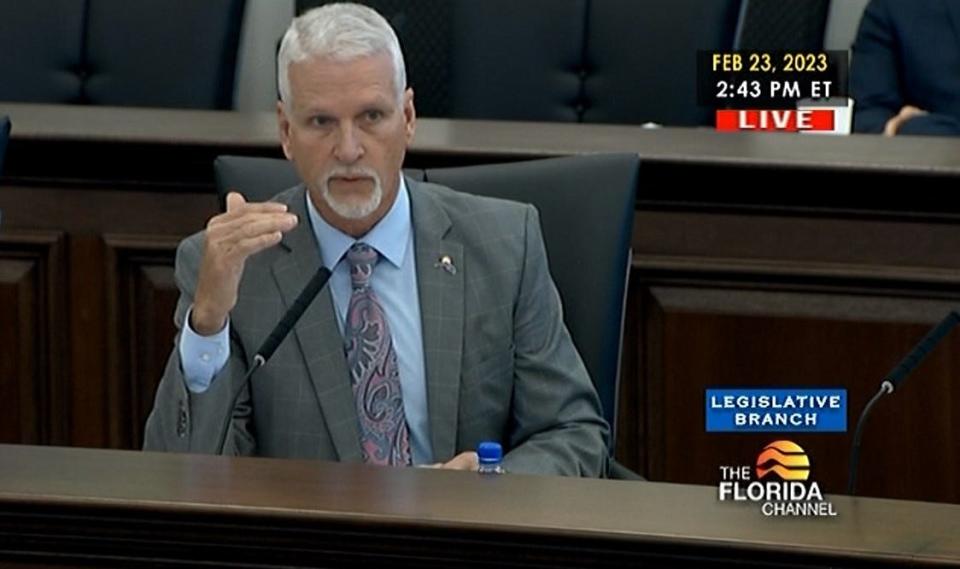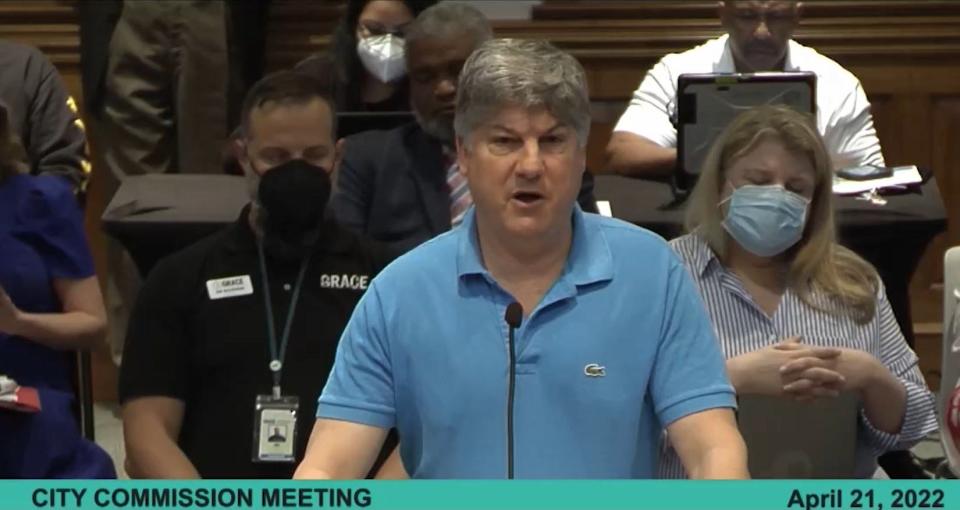‘Problematic at best’: Gainesville mayor cites financial harm to city with GRU bill
- Oops!Something went wrong.Please try again later.
- Oops!Something went wrong.Please try again later.
Gainesville Mayor Harvey Ward sent out a letter this week detailing what he considers numerous flaws with an unprecedented bill that aims to give control of a municipal utility to board members appointed by Gov. Ron DeSantis.
The letter was sent Wednesday to state Rep. Chuck Clemons, who sponsored the legislation, a day prior to approval by the Florida House of Representatives. It states that the implementation of House Bill 1645 is "problematic at best" and would have significant and negative effects on city government and taxpayers, despite a questionable economic impact report stating otherwise.
The bill calls for DeSantis to appoint a five-member, unpaid board that would have full autonomy for all GRU-related decisions, including selling utility assets, while also stripping away the Gainesville City Commission's century-long control. It was first filed last month following a 4-1 vote from the Republican-led Alachua County delegation, despite wide opposition among utility customers over the years, including those who spoke at the delegation's special meeting held in Tallahassee.
HB-165 currently awaits approval from the Senate Rules Committee.
"It may be that this bill will pass and that everything will be just fine," Ward wrote. "The information before me, and now before you, indicates that instead the process is fraught with great risk to the people you and I serve. That being the case, I ask you to pull this bill before it is voted on by the full House of Representatives."

Earlier coverage: Controversial GRU takeover bill filed in Legislature. What happens now?
Earlier coverage: Lawmakers grill Gainesville officials over utility management, debt
History of taking over GRU
In Florida, there is no municipal utility under the control of the governor, though many point to the political takeover of Disney's Reedy Creek as the closest similarity.
The push for control of GRU has a storied history spanning nearly a decade.
The latest attempt comes after a January 2022 state audit that noted Gainesville had more than $1.7 billion in debt, much of which comes on the utility side. Though the report has brought concern from lawmakers and some local residents, city officials have called Clemons' bill “politically motivated” and say it's the first step to eventually sell the utility to a major investor-owned utility, such as Florida Power and Light. Clemons, however, argues the bill prevents that from happening.
Much of what was in the state audit, including concerns over procurement cards and Reichart House management, were all previously discovered during internal audits in prior years. Clemons and Sen. Keith Perry, R-Gainesville, requested the audit after multiple unsuccessful bills and their failed 2018 referendum that asked voters whether a board should oversee GRU.
Along the campaign trail, Perry attacked GRU and city leadership, sometimes using deceptive messaging and making false claims that include saying electric rates were being increased to pay for a downtown ice rink that didn't exist.
In February, the Florida Joint Legislative Auditing Committee took up the issue of GRU at the request of Perry more than a year after the audit concluded. During the hearing, lawmakers threatened to have DeSantis remove city officials if they didn't come back in October with a bold, long-term debt-relief plan.

Since then, city officials have begun scaling back expenses and released a plan to pay down the city's debt by more than $300 million over the next 10 years.
That change, however, comes with a hefty cost of its own.
That plan includes an active hiring freeze for non-essential open positions, cutting some city services and homeless shelter funding, and increasing property taxes, as suggested by JLAC members. The plan also includes lowering what's been historically known as the general fund transfer (GFT) − money transferred from GRU to help pay for city services − by almost $20 million.
"We have responded in every way humanly possible to do what JLAC asked us to do," Ward said. "We took bold, swift action that is going to cause ripples of service and financial effects for the people of Gainesville for years to come. We continue to reach out to JLAC to be sure we're doing the things they asked us to do ... but this bill seems to be at odds with our abilities, or any city's ability, to meet the expectations that JLAC has placed on us."
Some, like Clemons, have echoed that GRU transfers more money to the general government side than it takes in, though experts at City Hall say those figures are fabricated and cherry-pick data using the depreciation of assets. Critics also claim that GRU is on the brink of collapse and bankruptcy, though all three major credit rating agencies give the municipal utility a top-tier grade − higher than FP&L and Duke Energy − and say it has less debt than some other Florida municipal utilities.
Uncharted territory
Ward, who took office in January with a new majority on the commission, is confused by the timing of Clemons' bill, largely because the city is actively working to address all the matters discussed ahead of their October deadline.
In his letter, Ward states that the bill will only make matters worse for Gainesville, financially, and result in a credit downgrade, a fear expressed by JLAC members during the February hearing. Dozens of professional staffers at the city and the city's external bond counsel, Holland & Knight − a nationally recognized firm − have expressed similar sentiments.
"At the root of all my logistical, administrative, and financial concerns is the reality that Gainesville Regional Utilities is part and parcel of the City of Gainesville and not a separate organization," Ward wrote.
"As such, mandating a separate leadership unit (the contemplated authority) that shares governing responsibility creates more challenges than I will list here. I believe the simple act of moving forward into uncharted territory ... will cause a downgrading of our current investment-grade bond ratings for both the utilities and the city's general government operations. Of course, this will create a financial burden that must be borne by the people of Gainesville, and likely by other utility ratepayers outside the city limits."
What do City Hall critics say?
A small group of regular fixtures at City Hall meetings are advocating for Clemons' bill, but none have been more involved than Nathan Skop, a recent unsuccessful judicial candidate.
Skop, who also is a licensed lawyer and arguably Gainesville government's most vocal critic, has signaled his advocacy for Clemons' bill and similar moves. He even went as far as producing the necessary economic impact report to support HB-1645, despite having no known financial licensing or accreditation as required to conduct the research.
In his report, he downplays the bill's effect and states there are no disadvantages to individuals, businesses or the local government for having a GRU Authority board, which he claims will lower rates.
"The management of the sole provider of energy in the GRU service area in a manner that is dedicated to deescalating their rising energy costs can only be advantageous to the customers," he wrote multiple times in the report.

The analysis is of note considering Skop's years of criticism and past statements where he has called on the city to consider selling GRU's electric system. Despite calling for lower utility rates, he has pushed back against a solar farm deal that was seen as a way to help lower costs long term and added additional legal fees for the city.
He has also previously spoken out against purchasing a controversial biomass plant that helped reduce utility bills by 8%-10% and bring down Gainesville's overall debt.
Skop also references his past time on the Florida Public Service Commission in his report.
The political operative, who has regularly called out others who supported the original biomass plant deal, was the swing vote in a May 2010 PSC meeting that allowed the costly biomass facility to move forward. Though he expressed some concern over the facilities' potential risk for the local municipality, Skop ultimately made a wavering motion to support it based on "local rule."
"You have a municipal government wanting to do something and the risk-reward lies in the lap of GRU and city of Gainesville as to whether their assumptions pan out in the long term," he said during the 2010 meeting. "There's opportunity costs, there are a lot of benefits that might get accrued ... If I were similarly faced with the situation at the local level, I would consider the base of action impudent based on the project risk."
That project ultimately resulted in the city taking on more than $2 billion in debt over 30 years. It was identified as one of the worst utility deals in the country.In 2017, Ward and others voted to buy out the unfavorable contract and facility despite pushback for more than $750 million. The purchase is expected to save taxpayers nearly $1 billion over three decades. That deal was later nominated for the national Bond Buyer's Deal of the Year.
This article originally appeared on The Gainesville Sun: Mayor Harvey Ward asks for Chuck Clemons' GRU bill to be pulled

